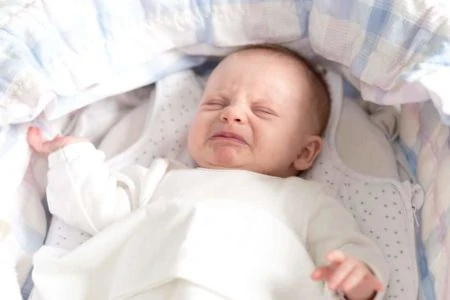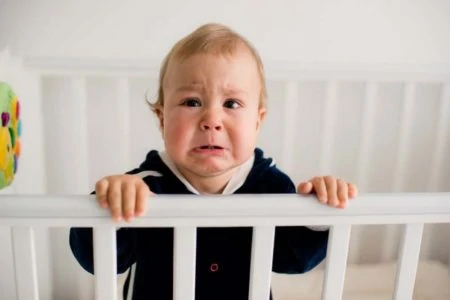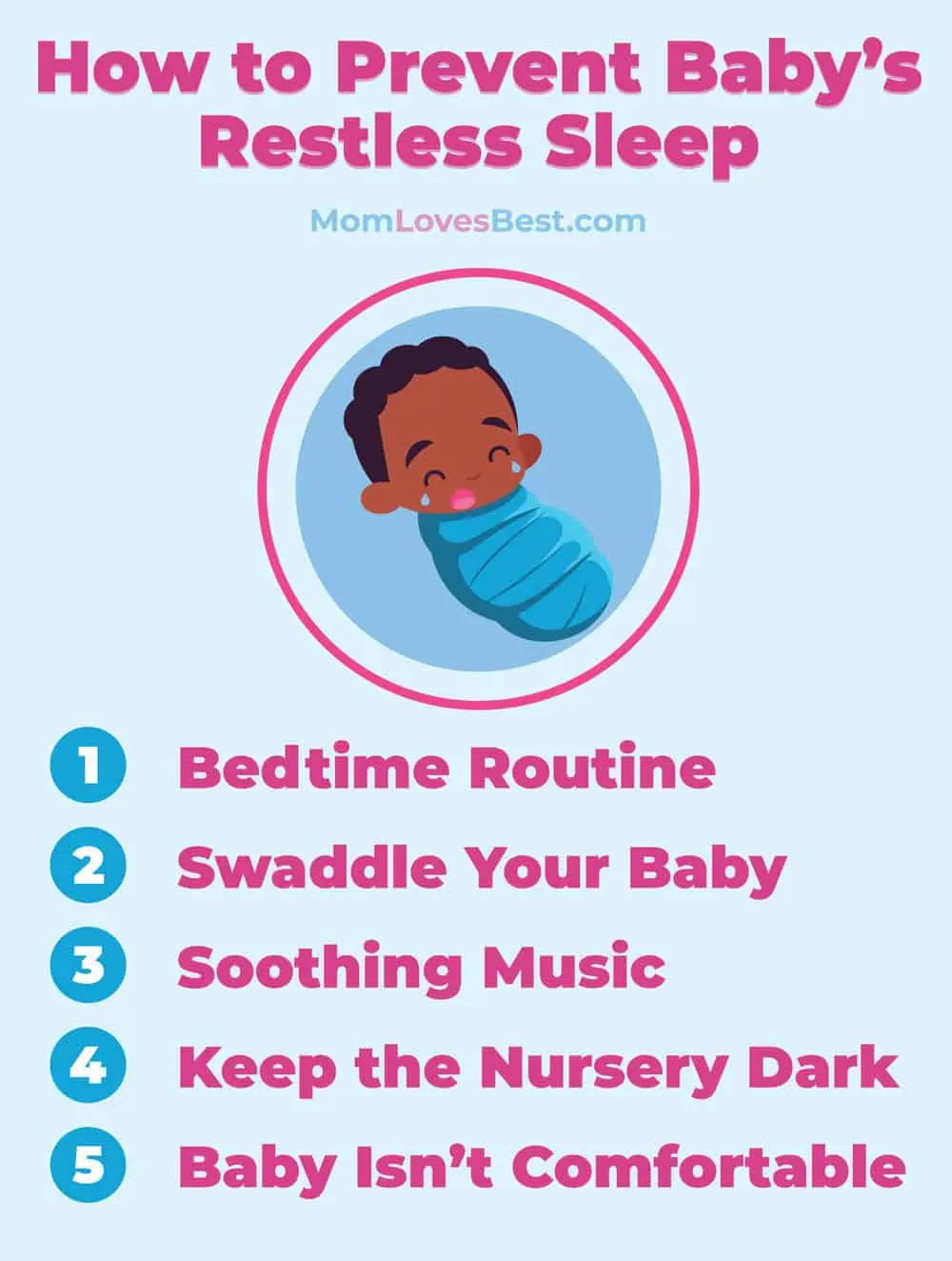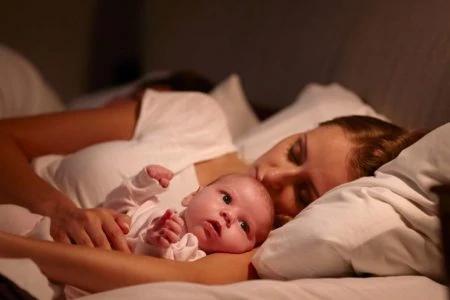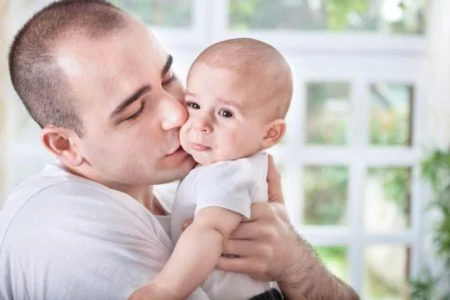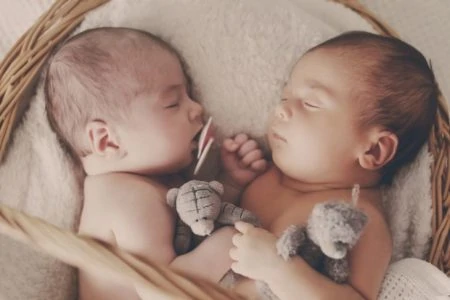Is your baby crying in the middle of the night, but when you rush in to check, they are sound asleep? It is confusing, and frankly, a little spooky. You might wonder if they are in pain, having a nightmare, or if you should wake them up.
I remember hovering over my son’s crib, heart racing, trying to decode his screams while his eyes remained shut tight. I had no idea if he needed a diaper change, milk, or just a cuddle. As I learned his rhythms, I realized he was often crying while fast asleep.
After digging into the research and consulting with pediatric experts, I learned that sleep crying is surprisingly common. Let’s look at why babies cry in their sleep, how to interpret the noises, and the best way to handle it without ruining everyone’s rest.
Key Takeaways
- Active sleep is noisy: Babies spend a lot of time in “active sleep” where crying, twitching, and whimpering are normal.
- Developing systems: An immature nervous system and transitioning sleep cycles often cause sudden cries.
- The pause method: When your baby cries in their sleep, wait a moment before rushing in to see if they settle on their own.
- Check for needs: If the crying persists or escalates, check for hunger, a dirty diaper, or illness.
Babies’ Sleep Patterns
To understand why your little one cries without waking up, we need to look at newborn sleep biology. Understanding these patterns will help you decide when to step in and soothe your baby or when to let them be.
In my clinical experience, the most common reasons an infant cries while asleep is either due to teething pain (over 6 months old) or a dream. They are not in any distress and are asleep despite the crying noises. I usually counsel my parents to check to ensure the baby is otherwise comfortable but allow them to continue sleeping.
Editor's Note:
Dr. Leah Alexander, MD, FAAPNewborns sleep most of the day, but they wake frequently for feeds. It often feels like they never sleep because they don’t follow a set schedule. Every baby has a unique rhythm, though most wake every two to three hours.
Newborns also lack a circadian rhythm. They often have their days and nights confused, sleeping long stretches during the day and partying at night. This is exhausting for parents. To fix this, keep the house bright and noisy during the day. At night, keep lights low and interactions boring. Over time, your baby will adjust.
Most babies won’t sleep longer than four-hour stretches until they are about three months old or weigh around 12 to 13 pounds. However, some babies take much longer to establish a pattern (1).
Ideally, once a routine is set, babies can sleep six to eight hours a night (2). But even then, they might cry while sleeping.
Sleep Stages of Babies
Babies cycle through sleep stages differently than adults. They have much shorter sleep cycles (about 50 to 60 minutes). This rapid cycling means more opportunities for noise (3).
1. Quiet Sleep
Your baby is deeply asleep here. Their breathing is rhythmic, eyes are still, and they barely move. You might hear an occasional sigh, but they are generally peaceful.
2. Active Sleep
This is the noisy stage. You will see rapid eye movement (REM) under their lids. Babies in active sleep might twitch, jerk, frown, smile, and yes, cry out. Their breathing might look irregular. This stage accounts for a large portion of infant sleep, which explains why they are such noisy sleepers.
3. Transitional Sleep
This happens when your baby shifts between quiet and active sleep. They might whimper, cry briefly, or open and close their eyes. This is often where parents mistake a sleeping baby for an awake one.
4. Waking Periods
Babies naturally wake up slightly between sleep cycles. If they know how to self-soothe, they drift back off. If not, they might fully wake up and cry for help.
Types of Sleep: REM vs. Non-REM
Beyond the stages, sleep is categorized into REM and Non-REM.
1. REM Sleep
REM (Rapid Eye Movement) is light sleep where dreaming occurs. Newborns spend about 50% of their sleep time in REM. Because their brain is highly active here, they are restless, vocal, and prone to crying out without waking.
2. Non-REM Sleep
This is the deeper, restorative sleep. It has four distinct stages:
- Stage 1: Drowsiness. Eyes may droop or close.
- Stage 2: Light sleep. The baby startles easily at sounds.
- Stage 3: Deep sleep. The baby is still and hard to wake.
- Stage 4: Very deep sleep. No movement and steady breathing.
Babies cycle through these stages multiple times a night. The transition from deep sleep (Stage 4) back to light sleep (REM) is often when the crying happens.
Why Do Babies Cry and Move in Their Sleep?
Babies practice their reflexes in the womb, and they continue this “workout” after birth. It takes months for them to coordinate their bodies and sleep cycles. Here are the main culprits for sleep crying:
1. Immature Nervous System
Your baby’s brain is still building connections. They cannot fully control their movements yet. This leads to involuntary twitching, flailing, and vocalizing. The “Moro Reflex” (startle reflex) can also cause them to jerk and cry out if they feel like they are falling.
2. Sleep Cycle Transitions
This is the most common reason. As babies move from deep sleep to light sleep, they experience a partial arousal. They might let out a scream, moan, or cry for a few seconds before settling into the next cycle.
3. Overtiredness
Ironically, if a baby stays awake too long, their body produces cortisol and adrenaline. This makes it harder to fall asleep and stay asleep. An overtired baby is more likely to be restless and cry during sleep transitions.
4. Physical Needs
While sleep crying is often harmless, sometimes it signals a need. Hunger, a wet diaper, being too hot or cold, or teething pain can cause a baby to fuss in their sleep. If the need is pressing, they will eventually wake up fully.
Can I Do Anything to Prevent Restless Sleep?
You cannot stop normal developmental sleep noises, but you can create an environment that encourages deeper rest.
1. Establish a Routine
Babies thrive on predictability. A consistent bedtime routine cues their brain that sleep is coming (4). Try a simple sequence:
- Feed: Ensure their belly is full.
- Bath: A warm bath is relaxing.
- Book or Song: Keep it calm and quiet.
- Bed: Place them down drowsy but awake.
Remember, it is important for infants to sleep on their back (not on their belly or side) and in a crib or bassinet to help prevent SIDS. The AAP gives more detail on this (5).
Editor's Note:
Dr. Leah Alexander, MD, FAAP2. Swaddle Your Baby
Newborns have a strong startle reflex that can wake them up. Swaddling mimics the womb and prevents their arms from flailing. If your baby can roll over, switch to a sleep sack instead.
3. Use White Noise
The womb was a loud place (as loud as a vacuum cleaner!). Silence can be unsettling for a newborn. A white noise machine can drown out household sounds and comfort your baby through sleep transitions.
4. Optimize the Environment
Keep the nursery dark (use blackout curtains) and cool (around 68°F to 72°F). Use a dim night light for diaper changes so you don’t fully wake the baby with bright overhead lights.
5. Check Comfort Levels
Ensure your baby isn’t overdressed. A good rule of thumb is to dress them in one more layer than you are wearing. Check their diaper before bed and use a high-absorbency overnight diaper if leaks are waking them up.
What Should I Do When My Baby Cries in Their Sleep?
Your instinct is to rush in and scoop them up. However, intervening too quickly can actually wake a sleeping baby who was just transitioning cycles.
The “Wait and Watch” Approach:
When you hear a cry, pause. Count to ten or wait a full minute if it is not a hysterical scream. Watch them on the monitor or peek through the door crack.
Often, you will see their eyes are still closed. They might fuss for a moment and then settle back into a deep sleep. If you pick them up immediately, you reset their sleep cycle and fully wake them, leading to a fragmented night for everyone.
If the crying continues or escalates into a rhythmic “I have a need” cry, then go in. Keep the lights low and your voice soft. Address the need (diaper, feed, comfort) with minimal stimulation so they can drift back off easily.
Can My Baby Have Nightmares?
It is unlikely. Most experts agree that true nightmares do not happen until a child has an active imagination, usually around age two or older.
However, babies and toddlers can experience night terrors. These usually happen in the first few hours of sleep. Your child might scream, thrash, and look terrified, but they are not actually awake. They won’t respond to you and won’t remember it in the morning (6).
If this happens, simply ensure they are safe physically and wait it out. Do not try to wake them, as this can distress them further.
FAQs
Laying It to Rest
Hearing your baby cry while asleep feels alarming, but it is usually a normal part of their development. Their brains are busy processing the world, and their sleep cycles are rapidly shifting.
Remember the “wait and watch” rule. Give your baby a moment to settle before rushing in. Most of the time, they will drift back into a quiet sleep on their own. If you ever feel like the crying sounds like pain or something is “off,” trust your gut and call your pediatrician. You know your baby best.
